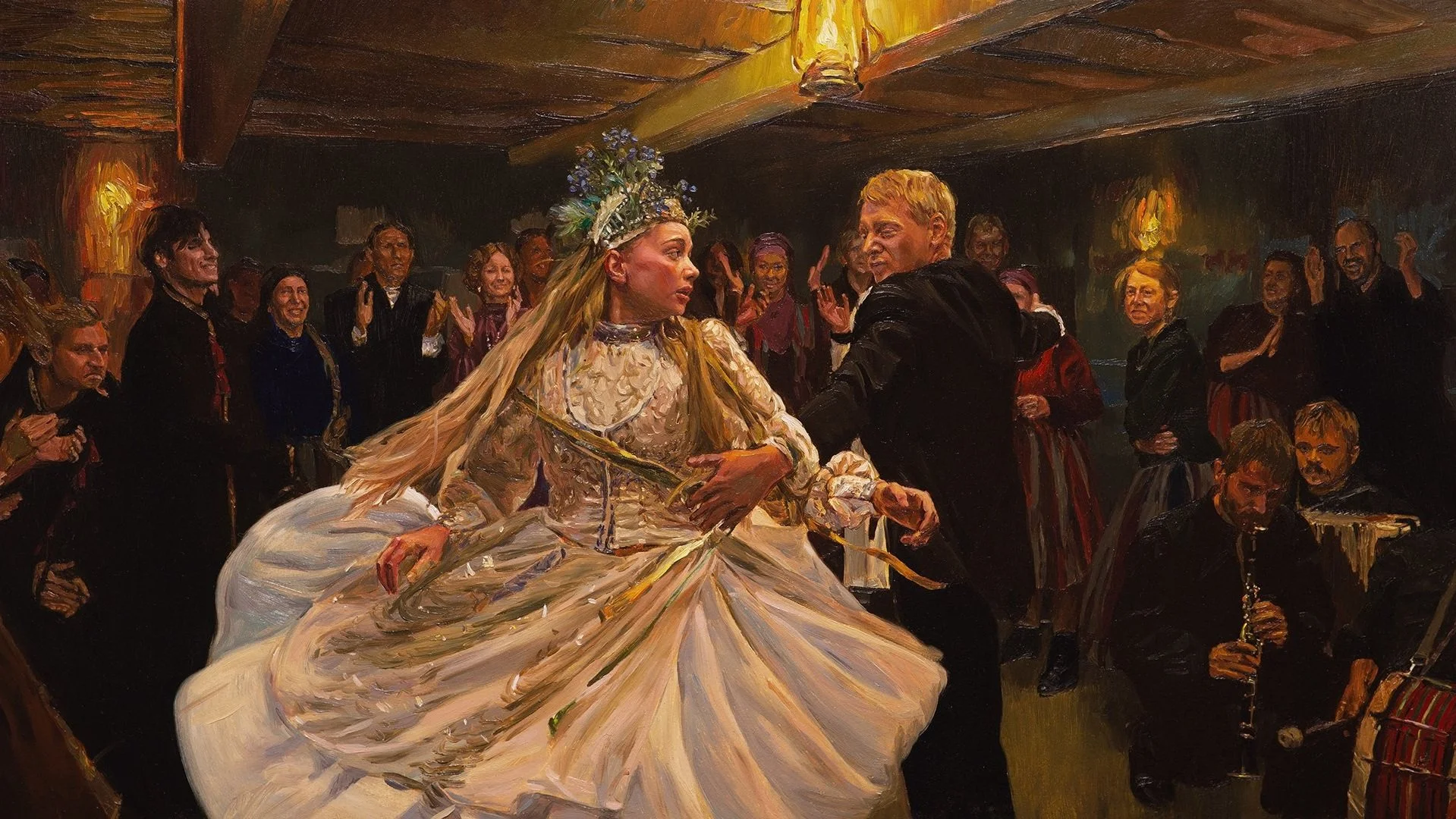The Peasants
The makers of Loving Vincent now animate a classic Polish novel set in the 19th century.
The work done by the married couple DK Welchman and Harry Welchman in their capacity as directors of feature films is undoubtedly a labour of love. Their first feature, 2017’s Loving Vincent, brought them huge acclaim, a reward for what had indeed been a very risky undertaking. That was because the process involved was so elaborate: first shot with actors, all the frames in the film were next hand-painted in oil and then animated with the result that the complete process took five years or more. Having survived that adventure so triumphantly, the Welchmans have now gone on to adapt the Polish novel Chlopi using the same method by which to bring it to the screen. It has again taken years to come to completion. The original novel was published in four volumes between 1904 and 1909 and then in 1924 won the Nobel Prize for Literature for its author Władysław Reymont. But while it remains well known in Poland many who see this film version will doubtless be unfamiliar with it even though it is now available in an English translation. Given the huge length of the novel, the film is of necessity abridged but what we have here is certainly a forceful narrative, one played out by a Polish cast and duly subtitled.
The Peasants is set in the 19th century in the Polish village of Lipce and the story it tells unfolds within the space of one year with a separate chapter heading for each of the four seasons starting with ‘Autumn’. It is on the one hand a social portrait showing a world in which people like the local squire wield power over those who work the land while the ordinary villagers also latch on to the idea of bettering their lot by acquiring more acres if they possibly can. One person with this outlook is a mother (Ewa Kasprzyk). When the most well-off of the farmers in the neighbourhood becomes a widower – that's Maciej Bosyna played by Miroslaw Baka - she quickly pushes her daughter, Jagna (Kamila Urzedowska), into marrying him. As the mother put it, "Love comes and goes but land stays".
It is in this context that the personal story emerges, one in which Jagna is the central figure. Here is a girl blessed with good looks so it is not surprising that the widower should be drawn to her, but she does not welcome the attentions of this much older man. In fact, it is Bosyna’s son Antek (Robert Gulaczyk) whom she fancies and they become lovers despite Antek being married to Hanka (Sonia Mietielica) and Jagna having by now become Antek’s stepmother. This is certainly a story in which Jagna is seen as a persecuted victim but she and Antek are not the kind of romanticised couple so often found in fiction. He has a darker side to him consistent with betraying his wife and Jagna herself has already had another lover, Mateusz (Mateusz Rusin). Indeed, The Peasants paints a bleak picture of village life since most of the women are unkind gossips who readily relish the scandal when Jagna’s husband catches her with his son and most of the men are lustful and keen to take advantage, that includes the mayor himself (Andrzej Konopka).
While this portrait of Polish life in the 19th century is grim, the film nevertheless has a feel for the rural life-style of Poland as reflected in scenes at dances and in its depiction of a cabbage festival and the music score by Lukas Rostowski adds to the atmosphere achieved. It's also the case that scenes which might have become too melodramatic steer clear of that and there is no doubt that the filmmakers wish to portray Jagna as a tragic figure, a woman who suffers at the hands of her community. It may even be that her story is now being offered to us from a feminist perspective but, if the viewer can indeed lament her fate, her behaviour often shows a lack of consideration for others that reduces our sympathy for her. Furthermore, Kamila Urzedowska who plays her has looks that belong less persuasively to the period than is the case with such actors as Mirislaw Baka whose portrayal of Maciej Bosyna is particularly well-judged.
As for the process that creates the visual style favoured by the Welchmans, I have to say that, despite the praise which it earned, Loving Vincent left me uneasy with the way in which the images, especially those of faces, were made up of lines which appeared to flicker and run distractingly. Although I continue to feel that here to some extent, there has either been some improvement or I have started to adjust to it. But, if even now I am not wholly won over, I can nevertheless admire the compositions which grace this film. Van Gogh’s own paintings inspired Loving Vincent and, while with one exception there is no direct equivalent in The Peasants, the Welchmans again display their eye for the visual. Overall, The Peasants is a brave undertaking that works up to a point, but this ambitious work never attains the depth of impact that must have been the aim.
Original title: Chlopi.
MANSEL STIMPSON
Cast: Kamila Urzedowską, Robert Gulaczyk, Miroslaw Baka, Sonia Mietielica, Ewa Kasprzyk, Mateusz Rusin, Cezary Łukaszewicz, Andrzej Konopka, Sonia Bohosiewicz, Maciej Musiał, Cyprian Grabowski.
Dir DK Welchman and Hugh Welchman, Pro Sean M. Bobbitt and Hugh Welchman, Screenplay DK Welchman from the novel Chlopi by Władysław Reymont, Ph Szymon Kuriata, Radek Ladczuk and Kamil Polak, Pro Des Piotr Dominiak and Elwira Pluta, Ed Beata Hincke, Patrycja Piróg, Miki Wecel and DK Welchman, Music Lukas Rostkowski, Costumes Katarzyna Lewińska, Animation Maria Broniarz, Dimitrije Baltic, Agata Huzarska and Milena Kolesniak.
Break Thru Productions/Digitalkraft/Art Shot/Canal+/Narodowe Centrium Kultury-Vertigo Releasing.
114 mins. Poland/Serbia/Lithuania. 2023. UK Rel: 8 December 2023. Cert. 15.


